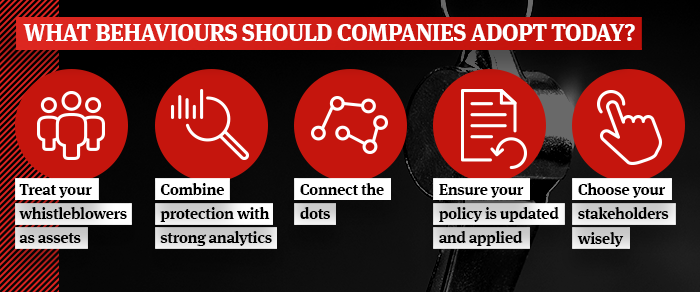
Publication
HKEx's commitment to sustainability: The new phase of paperless regulatory reform
In recent years, the Hong Kong Stock Exchange (HKEx) has introduced several initiatives to digitize its regulatory processes.

Global | Publication | July 2018
Rarely have public institutions and businesses around the world been under greater scrutiny. Social media not only powers a 24/7 global news cycle, it also provides a broad platform for a new breed of influencers whose endorsements range from consumer products to political parties.
Against a background of increased demand for transparency, frequent exposure of misconduct, and shifting consumer loyalties, it is increasingly challenging for businesses to maintain employee, customer and stakeholder trust. While some businesses are successful, the most recent Edelman trust barometer points to a consistently declining rate of public trust in Australian companies and institutions.
In response to this decline in trust, we have seen legislative reform, mandating increased corporate transparency: the Commonwealth Parliament introduced legislation that will fundamentally change whistleblower protections. The Treasury Laws Amendment (Whistleblowers) Bill 2017 (the Bill) is expected to be passed later this year and aims to:
Business should start with the things they can control. In particular:
While neither is an easy or short-term fix, each is a likely reliable starting point for businesses to earn trust, as it is a strategy which seeks to directly manage conduct risk at a cultural level.
An increasingly common symptom of a negative workplace culture is where an employee, or even a group of employees, takes to social media to air complaints. This often occurs where an employee feels their complaints were ignored or unresolved. The reputational damage of such incidents is long-lasting and can affect a range of corporate indicators, from share price to employer branding. Managed proactively, however, a whistleblowing incident can become a catalyst for creating a culture of trust and transparency. Also, whistleblowing can be your early warning system – revealing misconduct before it becomes systemic. But what steps can be taken to proactively manage whistleblowing? We asked our regulatory, human rights, and employment and labour experts what key changes can be implemented, and how these initiatives can affect future perceptions.

Treat your whistleblowers as assets
Whistleblowers can provide some of the first danger signals when it comes to organisational misconduct, or unethical or inappropriate workplace behaviour. Building a transparent culture that encourages reporting, while protecting confidentiality, will help foster trust. Adopting a “speak up” not “whistleblowers” policy will help destigmatise internal reporting of concerns.
Combine full protection with strong analytics
As the Bill extends protection beyond employees (including to suppliers and family members), easily accessible whistleblowing technology is essential to service off-site whistleblowers.
With technology comes the benefit of a centralised data point. This can provide an additional metric for effecting change through using analytics. Analytics can help better understand the patterns of complaints. This data can provide critical insight into systemic issues the business might be facing and what cultural changes might need to be explored. In harnessing technology, businesses can create effective change and benchmark their progress.
Connect the dots
Whistleblowing can be a manifestation of broader cultural issues. Patterns in service area, and gravity and frequency of complaints, when connected to other data within your organisation, might reveal risk trends and point to issues you will need to address. Other data of interest may include financial results, expenses and staff turnover.
Keep your policy updated, and ensure that it is broadly understood within your organisation and your supply chain
Consistency is an important aspect of a successful whistleblowing policy and management process, as is extending your policy throughoutyour supply chain. This latter aspect of the upcoming whistleblower legislation is consistent with another recent development: the proposed Modern Slavery Act for Australia, which requires reporting on operational and supply chain risk, and is indicative of a broader trend for transparency in supply chains. By extending reporting platforms to suppliers, businesses also provide a mechanism to identify supplier fraud, corruption or conflict of interest in their supply chain.
Choose your stakeholders wisely
Within businesses various employees will have complementary skills in the areas of whistleblowing management and conduct risk. While tone from the top is essential, it is equally important to assign management responsibility to a cross-functional team including legal, compliance and HR. Where your team includes lawyers, proactively consider how legal professional privilege may (or may not) apply. It is important to ensure your whistleblowing procedure makes clear when in-house lawyers are acting in a legal role.

Publication
In recent years, the Hong Kong Stock Exchange (HKEx) has introduced several initiatives to digitize its regulatory processes.
Subscribe and stay up to date with the latest legal news, information and events . . .
© Norton Rose Fulbright LLP 2025